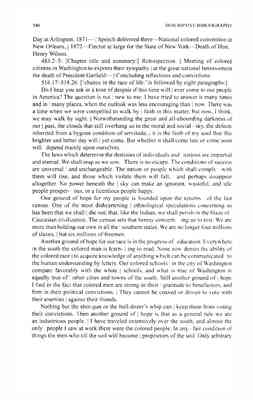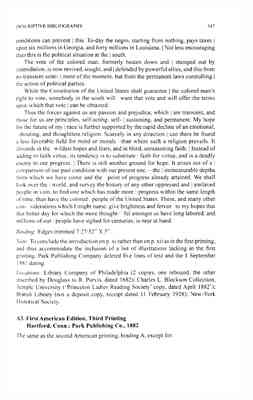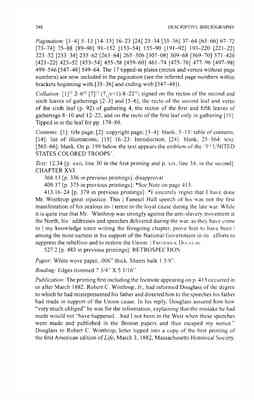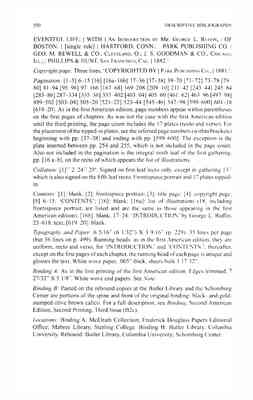Pages
6
546 DESCRIPTIVE BIBLIOGRAPHY
Day at Arlington, 1871—│Speech delivered there—National colored convention at New Orleans,│1872—Elector at large for the State of New York—Death of Hon.│ Henry Wilson. 483.2-5: [Chapter title and summary:] Retrospection.│Meeting of colored citizens in Washington to express their sympathy│at the great national bereavement the death of President Garfield—│Concluding reflections and convictions. 516.17-518.26: ['chance in the race of life.' is followed by eight paragraphs:] Do I hear you ask in a tone of despair if this time will│ever come to our people in America? The question is not│new to me. I have tried to answer it many times and in│many places, when the outlook was less encouraging than│now. There was a time when we were compelled to walk by│faith in this matter, but now, I think, we may walk by sight.│Notwithstanding the great and all-abounding darkness of our│past, the clouds that still overhang us in the moral and social│sky, the defects inherited from a bygone condition of servitude,│it is the faith of my soul that this brighter and better day will│yet come. But whether it shall come late or come soon will│depend mainly upon ourselves. The laws which determine the destinies of individuals and nations are impartial and eternal. We shall reap as we sow.│There is no escape. The conditions of success are universal│and unchangeable. The nation or people which shall comply with them will rise, and those which violate them will fall, and perhaps disappear altogether. No power beneath the│sky can make an ignorant, wasteful, and idle people prosper-│ous, or a licentious people happy. One ground of hope for my people is founded upon the returns of the last census. One of the most disheartening│ethnological speculations concerning us has been that we shall│die out; that, like the Indian, we shall perish in the blaze of Caucasian civilization. The census sets that heresy concern- ing us to rest. We are more than holding our own in all the│southern states. We are no longer four millions of slaves,│but six millions of freemen. Another ground of hope for our race is in the progress of education. Everywhere in the south the colored man is learn-│ing to read. None now denies the ability of the colored race│to acquire knowledge of anything which can be communicated to the human understanding by letters. Our colored schools in the city of Washington compare favorably with the white│schools, and what is true of Washington is equally true of│other cities and towns of the south. Still another ground of│hope I find in the fact that colored men are strong in their│gratitude to benefactors, and firm in their political convictions.│They cannot be coaxed or driven to vote with their enemies│against their friends. Nothing but the shot-gun or the bull-dozer's whip can│keep them from voting their convictions. Then another ground of│hope is that as a general rule we are an industrious people.│I have traveled extensively over the south, and almost the only│people I saw at work there were the colored people. In any fair condition of things the men who till the soil will become│proprietors of the soil. Only arbitrary
7
DESCRIPTIVE BIBLIOGRAPHY 547
conditions can prevent│this. To-day the negro, starting from nothing, pays taxes│ upon six millions in Georgia, and forty millions in Louisiana.│Not less encouraging than this is the political situation at the│south. The vote of the colored man, formerly beaten down and│stamped out by intimidation, is now revived, sought, and│defended by powerful allies, and this from no transient senti-│ment of the moment, but from the permanent laws controlling│ the action of political parties. While the Constitution of the United States shall guarantee│the colored man's right to vote, somebody in the south will│want that vote and will offer the terms upon which that vote│can be obtained. Thus the forces against us are passion and prejudice, which│are transient, and those for us are principles, self-acting, self-│sustaining, and permanent. My hope for the future of my│race is further supported by the rapid decline of an emotional, shouting, and thoughtless religion. Scarcely in any direction│can there be found a less favorable field for mind or morals│than where such a religion prevails. It abounds in the│wildest hopes and fears, and in blind, unreasoning faith.│Instead of adding to faith virtue, its tendency is to substitute│faith for virtue, and is a deadly enemy to our progress.│There is still another ground for hope. It arises out of a│ comparison of our past condition with our present one,—the│immeasurable depths from which we have come and the│point of progress already attained. We shall look over the│world, and survey the history of any other oppressed and│enslaved people in vain, to find one which has made more│progress within the same length of time, than have the colored people of the United States. These, and many other con- siderations which I might name, give brightness and fervor│to my hopes that that better day for which the more thought- ful amongst us have long labored, and millions of our│people have sighed for centuries, is near at hand.
Binding: Edges trimmed 7 27/32" X 5".
Note: To conclude the introduction on p. xi rather than on p. xii as in the first printing, and thus accommodate the inclusion of a list of illustrations lacking in the first printing, Park Publishing Company deleted five lines of text and the 1 September 1881 dating.
Locations: Library Company of Philadelphia (2 copies, one rebound, the other inscribed by Douglass to R. Purvis, dated 1882); Charles L. Blockson Collection, Temple University ('Princeton Ladies Reading Society' copy, dated April 1882'); British Library (not a deposit copy, receipt dated 11 February 1928); New-York Historical Society.
A3. First American Edition, Third Printing Hartford, Conn.: Park Publishing Co., 1882
The same as the second American printing, binding A, except for:
8
548 DESCRIPTIVE BIBLIOGRAPHY
Pagination: [1-4] 5-13 [14-15] 16-23 [24] 25-34 [35-36] 37-64 [65-66] 67-72 [73-74] 75-88 [89-90] 91-152 [153-54] 155-90 [191-92] 193-220 [221-22] 223-32 [233-34] 235-62 [263- 64] 265-306 [307-08] 309-68 [369-70] 371-420 [421-22] 423-52 [453-54] 455-58 [459-60] 461-74 [475-76] 477-96 [497-98] 499-546 [547-48] 549-64. The 17 tipped-in plates (rectos and versos without page numbers) are now included in the pagination (see the inferred page numbers within brackets beginning with [35-36] and ending with [547-48]).
Collation: [1]12 2-612 [7]13 (712 v+l) 8-2212; signed on the rectos of the second and sixth leaves of gatherings [2-3] and [5-6], the recto of the second leaf and verso of the sixth leaf (p. 92) of gathering 4, the rectos of the first and fifth leaves of gatherings 8-10 and 12-22; and on the recto of the first leaf only in gathering [11]. Tipped in is the leaf for pp. 179-80.
Contents: [1]: title page; [2]: copyright page; [3-4]: blank; 5-13: table of contents; [14]: list of illustrations; [15] 16-23: Introduction; [24]: blank; 25-564: text; [565-66]: blank. On p. 199 below the text appears the emblem of the '3rd UNITED STATES COLORED TROOPS'.
Text: 12.34 [p. xxii, line 30 in the first printing and p. xix, line 34, in the second]: CHAPTER XVI. 368.13 [p. 336 in previous printings]: disapproval 409.37 [p. 375 in previous printings]: *See Note on page 413. 413.16-24 [p. 379 in previous printings]: *I sincerely regret that I have done Mr. Winthrop great injustice. This│Faneuil Hall speech of his was not the first manifestation of his zealous in-│terest in the loyal cause during the late war. While it is quite true that Mr.│Winthrop was strongly against the anti-slavery movement at the North, his│addresses and speeches delivered during the war, as they have come to│my knowledge since writing the foregoing chapter, prove him to have been│ among the most earnest in his support of the National Government in its efforts to suppress the rebellion and to restore the Union.│FREDERICK DOUGLAS. 527.2 [p. 483 in previous printings]: RETROSPECTION.
Paper: White wove paper, .006" thick. Sheets bulk 1 5/8".
Binding: Edges trimmed 7 3/4" X 5 1/16".
Publication: The printing first including the footnote appearing on p. 413 occurred in or after March 1882. Robert C. Winthrop, Jr., had informed Douglass of the degree to which he had misrepresented his father and directed him to the speeches his father had made in support of the Union cause. In his reply, Douglass assured him how "very much obliged" he was for the information, explaining that the mistake he had made would not "have happened...had I not been in the West when these speeches were made and published in the Boston papers and thus escaped my notice." Douglass to Robert C. Winthrop, letter tipped into a copy of the first printing of the first American edition of Life, March 3, 1882, Massachusetts Historical Society.
9
DESCRIPTIVE BIBLIOGRAPHY 549
Locations: Charles L. Blockson Collection, Temple University; McElrath Collection.
A4. First American Edition, Fourth Printing Hartford, Conn.: Park Publishing Company, 1882
The same as the third printing, binding A, except [1-12]12 1312 [14- 21]12 [22]13 (2212 v + l ). Signed only on the rectos of the second and sixth leaves in gathering [13]12 (pp. 311 and 319). Tipped in is the leaf for pp. 563-64. (See Note.) Edges trimmed 7 13/16" X 5 1/16".
Location: Lilly Library, Indiana University.
Note: That this printing was used for the typesetting of the second American edition is suggested by the signing of the latter's gathering 13 in its first printing: it is the only gathering signed twice, on the rectos of its first and fifth leaves.
A5. First American Edition, Fifth Printing (A5) Hartford, Conn.: Park Publishing Company, 1882
The same as the fourth printing, binding A, except all gatherings are unsigned. Edges trimmed 7 13/16" X 5 1/8.
Location: Buffalo and Erie County Central Library.
* * * B1. Second American Edition. First Printing Hartford, Conn.: Park Publishing Co., et al., 1882
Title Page: 30 lines 'LIFE AND TIMES OF FREDERICK DOUGLASS,│WRITTEN BY HIMSELF. HIS EARLY LIFE AS A SLAVE, HIS ESCAPE FROM BONDAGE,│AND│HIS COMPLETE HISTORY TO THE PRESENT TIME, INCLUDING│[13 lines with progressively more narrow widths:] HIS CONNECTION WITH THE ANTI-SLAVERY MOVEMENT; HIS LABORS IN GREAT BRITAIN│AS WELL AS HIS OWN COUNTRY; HIS EXPERIENCE IN THE CONDUCT OF AN│INFLUENTIAL NEWSPAPER; HIS CONNECTION WITH THE UNDERGROUND RAILROAD; HIS RELATIONS WITH JOHN BROWN AND THE HARPER'S FERRY RAID; HIS RECRUITING THE 54TH AND 55TH MASS. COLORED REGIMENTS; HIS INTER-│VIEWS WITII PRESIDENTS LINCOLN AND JOHNSON; HIS APPOINTMENT│BY GEN. GRANT TO ACCOMPANY THE SANTO DOMINGO COMMISSION│ALSO TO A SEAT IN THE COUNCIL OF THE DISTRICT OF COLUMBIA;│HIS APPOINTMENT AS UNITED STATES MARSHALL BY PRESIDENT│R. B. HAYES; ALSO HIS APPOINTMENT TO BE RECORDER OF DEEDS IN WASHINGTON BY PRESIDENT J. A. GARFIELD;│WITH MANY OTHER INTERESTING AND IMPORTANT│EVENTS OF HIS MOST
10
550 DESCRIPTIVE BIBLIOGRAPHY
EVENTFUL LIFE:│WITH I AN INTRODUCTION BY MR. GEORGE: L. RUFFIN,│OF BOSTON.│[single rule]│HARTFORD, CONN.:│PARK PUBLISHING CO.│ GEO. M. REWELL & CO., CLEVELAND, O.; J. S. GOODMAN & CO., CHICAGO, ILL.;│PHILLIPS & HUNT, SAN FRANCISCO, CAL.│1882.'.
Copyright page: Three lines, 'COPYRIGHTED BY│PARK PUBLISHING CO.,│1881.'.
Pagination: [1-5] 6-15 [16] [16a- 16b] 17-36 [37-38] 39-70 [71-72] 73-78 [7980] 81-94 [95-96] 97-166 [167-68] 169-208 [209-10] 211-42 [243-44] 245-84 [285-86] 287-334 [335-36] 337-402 [403-04] 405-60 [461-62] 463-96 [497-98] 499-502 [503-04] 505-20 [521-22] 523-44 [545-46 ] 547-98 [599-600] 601-18 [619-20]. As in the first American edition, page numbers appear within parentheses on the first pages of chapters. As was not the case with the first American edition until the third printing, the page count includes the 17 plates (recto and verso). For the placement of the tipped-in plates, see the inferred page numbers (within brackets) beginning with pp. [37- 38] and ending with pp. [599-600]. The exception is the plate inserted between pp. 254 and 255, which is not included in the page count. Also not included in the pagination is the integral ninth leaf or the first gathering, pp. [16 a-b], on the recto of which appears the list of illustrations.
Collation: [1]12 2-2412 256. Signed on first leaf recto only, except in gathering 1312 which is also signed on the fifth leaf recto. Frontispiece portrait and 17 plates tippedin.
Contents: [1]: blank; [2]: frontispiece portrait; [3]: title page; [4]: copyright page; [5] 6-15: 'CONTENTS'; [16]: blank; [16a]: list or illustrations (18, including frontispiece portrait, are listed and are the same as those appearing in the first American edition); [16b]: blank; 17-24: 'INTRODUCTION' by George L. Rutlin; 25-618: text; [619-20]: blank.
Typography and Paper: 6 5/16" (6 1/32") X 3 9/16" (p. 229). 35 lines per page (but 36 lines on p. 499). Running heads: as in the first American edition, they are uniform, recto and verso, for 'INTRODUCTION.' and 'CONTENTS.'; thereafter, except on the first pages of each chapter, the running head of each page is unique and glosses the text. White wove paper, .005" thick, sheets bulk 1 17/32".
Binding A: As in the first printing of the first American edition. Edges trimmed, 7 27/32" X 5 1/8". White wove end papers. See Note.
Binding B: Pasted on the rebound copies at the Butler Library and the Schomburg Center are portions of the spine and front of the original binding: black- and goldstamped olive brown calico. For a full description, see Binding. Second American Edition, Second Printing. Third Issue (B2c).
Locations: Binding A: McElrath Collection; Frederick Douglass Papers Editiorial Office; Mabree Library, Sterling College. Binding B: Butler Library, Columbia University. Rebound: Butler Library, Columbia University; Schomburg Center.




